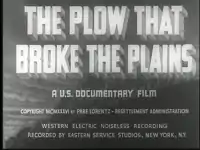The Plow That Broke the Plains
The Plow That Broke the Plains is a 1936 short documentary film which shows what happened to the Great Plains region of the United States and Canada when uncontrolled agricultural farming led to the Dust Bowl. It was written and directed by Pare Lorentz. The film was narrated by the American actor and baritone Thomas Hardie Chalmers.
| The Plow That Broke the Plains | |
|---|---|
 | |
| Directed by | Pare Lorentz |
| Written by | Pare Lorentz |
| Music by | Virgil Thomson |
| Cinematography | Leo Hurwitz Ralph Steiner Paul Strand Paul Ivano |
| Edited by | Pare Lorentz Ralph Steiner |
| Distributed by | U.S. Resettlement Administration |
Release date |
|
Running time | 25 min. (without Epilogue) |
| Country | United States |
| Language | English |
In 1999, The Plow That Broke the Plains was selected for preservation in the United States National Film Registry by the Library of Congress as being "culturally, historically, or aesthetically significant".[1][2]
Production and content
The film was sponsored by the United States government (Resettlement Administration) to raise awareness about the New Deal and was intended to cost $6,000 or less; it eventually cost over $19,000 and Lorentz, turning in many receipts written on various scraps of paper, had many of his reimbursements denied and paid for much of the film himself. Lorentz later faced criticism for appearing to blame westward bound settlers for the ecological crisis by having eroded the soil of the Plains with unrestrained farming, but the film nonetheless succeeded in driving home the message of the severity of the problem caused by the misuse of land.
According to Robert L. Snyder's book about Lorentz,[3] the filmmaker's favorite comment about the movie was something he heard an audience member say in the row ahead of him: "They never should have plowed them plains."
Soundtrack
Lorentz worked on the film with composer Virgil Thomson, who shared Lorentz's enthusiasm for folk music and incorporated many folk melodies, along with other popular and religious music, into the soundtrack.
Virgil Thomson compiled a concert suite from his original score, which has been performed and recorded. Its first recording was made on RCA 78s in 1946 by the newly formed Hollywood Bowl Symphony Orchestra under its founder and first conductor, Leopold Stokowski. One of the earliest stereo recordings was made for Vanguard Records in 1961, again with Leopold Stokowski, this time conducting the Symphony of the Air. The original Vanguard LP and its later CD reissue also included a suite from Thomson's score for another Lorentz documentary, The River.
Alternate versions
The film exists in at least three versions. The original includes an epilogue detailing the activities of the Resettlement Administration. The most common version today on DVD omits this final chapter. Finally, another contemporary version places the scrolling Prologue text before the opening credits.
See also
References
- "Complete National Film Registry Listing | Film Registry | National Film Preservation Board | Programs at the Library of Congress | Library of Congress". Library of Congress, Washington, D.C. 20540 USA. Retrieved 2020-05-07.
- "Preserving the Silver Screen (December 1999) - Library of Congress Information Bulletin". www.loc.gov. Retrieved 2020-08-03.
- Snyder, Robert L. (1994). Pare Lorentz and the Documentary Film. University of Nevada Press. ISBN 0874172314.
External links
- Media
- The Plow That Broke the Plains is available for free download at the Internet Archive
- The Plow that Broke the Plains video at YouTube
- Other
- The Plow That Broke the Plains essay by Dr. Robert J. Snyder at National Film Registry
- Reaping the Golden Harvest - University of Virginia
- The Plow that Broke the Plains - University of Virginia
- The Plow that Broke the Plains review - American Music Preservation
- The Plow That Broke the Plains at IMDb
- The Plow That Broke the Plains essay by Daniel Eagan in America's Film Legacy: The Authoritative Guide to the Landmark Movies in the National Film Registry, A&C Black, 2010 ISBN 0826429777, pages 242-243